Discussing Alcohol With Your College Student
Parents You’re Not Done Yet
We know many college students make responsible decisions about alcohol consumption. In fact, according to the just released 2018 Monitoring the Future survey, drinking among college students declined from 2017 to 2018, and binge drinking among college students has declined significantly to an all-time low level.
This news is encouraging and shows the tremendous steps that have been taken to reduce underage drinking are working. For many students, however, transition to college life combined with the availability of alcohol and the desire to fit in to their new surroundings can lead students to make risky decisions. Dangerous overconsumption of alcohol by college students continues to be a health and safety issue in spite of laws, campus policies, and college programs.
According to the National Institute on Alcohol Abuse and Alcoholism, the first six weeks of a student’s first year in college are a vulnerable time for harmful and underage college drinking and alcohol-related consequences because of student expectations and social pressures at the start of the academic year. College drinking not only impacts the drinking student, but also those around them even if they choose not to drink.
You’ve gotten your kids this far, but PARENTS, YOU’RE NOT DONE YET.
Talking to your college bound students about alcohol, underage drinking, and binge drinking is critical, and ongoing communication is key. When talking about choices regarding alcohol, engage in these discussions about the choices students have and actions they should consider in order to stay safe.
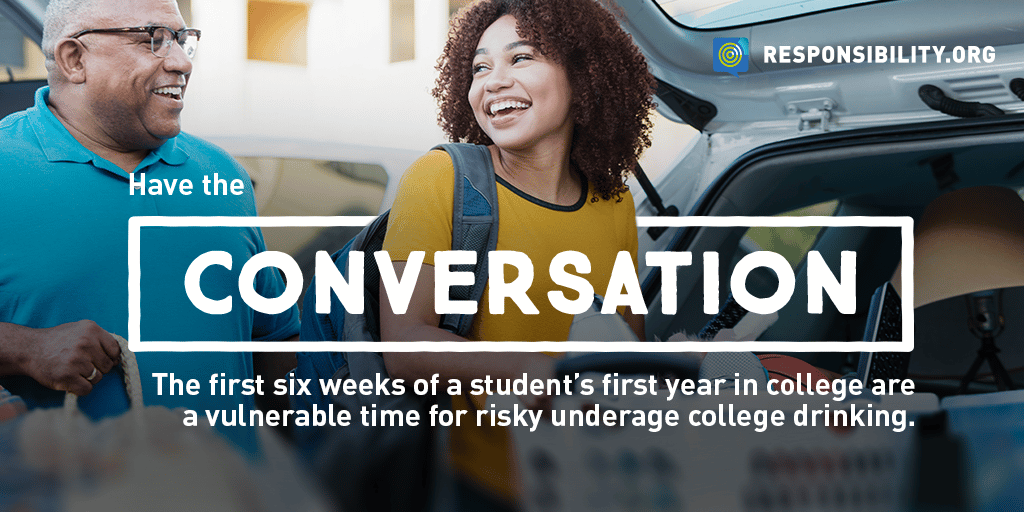
KNOW THE RISKS OF COLLEGE DRINKING
Educate yourself and your college-bound students about the differences between low risk and high risk drinking, and remind them that any underage drinking is risky behavior and illegal.
Lower risk drinking is:
- Being 21 or older.
- Knowing your limit.
- Thinking about whether or not you will drink and what you will drink before the party.
- Eating a complete meal before drinking.
- Alternating alcohol-free drinks throughout the evening or event.
- Having a plan; knowing how you will get home safely.
- Making sure you and your friends have each other’s backs.
- Recognizing that, in some settings, the safer amount to drink will be little or none. Not all parties and clubs are equally safe!
- Recognizing that abstaining from consuming alcohol is the safest choice.
Higher risk drinking is:
- Binge drinking (4 or more drinks in a day for a woman, 5 or more drinks in a day for a man)
- Pregaming, chugging, drinking games, drinking anything out of a punch bowl, garbage can, trough, hose or funnel.
- Drinking to get drunk (intoxicated).
- Driving after drinking or riding with someone under the influence.
- Drinking too much too fast.
- Going to parties where people drink too much.
- Going to a party or social event alone or where you don’t know anyone.
- Not knowing what is in your glass or leaving it unattended.
- Mixing alcohol with drugs (legal or illegal) or medications.
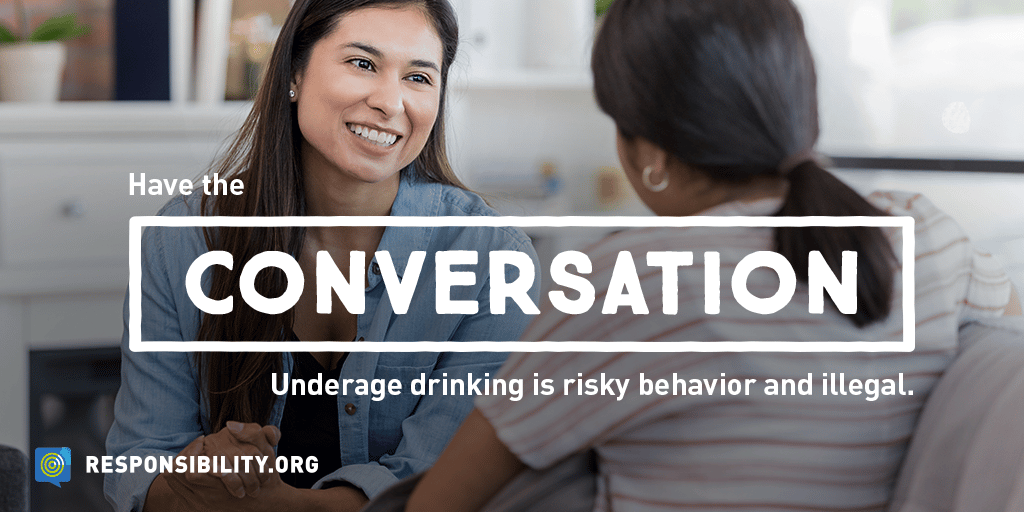
KNOW THE FACTS ABOUT DRINKING IN COLLEGE
Although many students entering college have some experience with alcohol, most are not engaging in binge drinking.
Despite the fact that it is illegal for many college students to purchase or consume alcohol, they many have had some experience with alcohol by time they arrive on college campuses – 54% of high school seniors have tried alcohol in their lifetime. 79% of college students have tried alcohol in their lifetime, but many are over the legal drinking age when this question is asked of them.
Binge drinking is not a rite of passage. The majority of college students do not binge drink and even more do not engage in extreme levels of binge drinking. According to the 2020 Monitoring the Future Study, only 24% of college students self-report binge drinking (defined as five or more drinks in a row) at least once in the past two weeks, and even fewer engage in extreme levels of drinking.
One in nine (11%) college students reported they have consumed 10 or more drinks in a row at least once in the past two weeks, including two percent who reported consuming 15 or more drinks in a row.
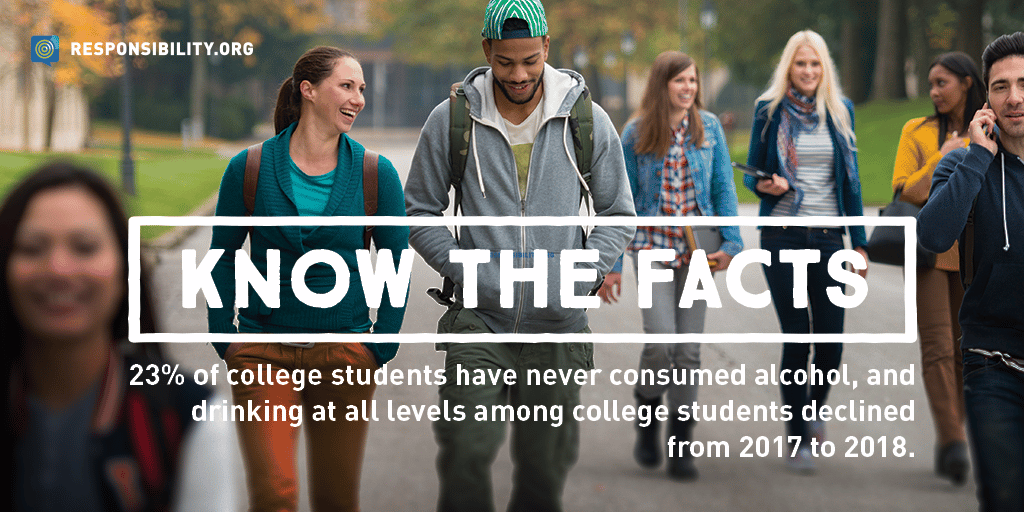
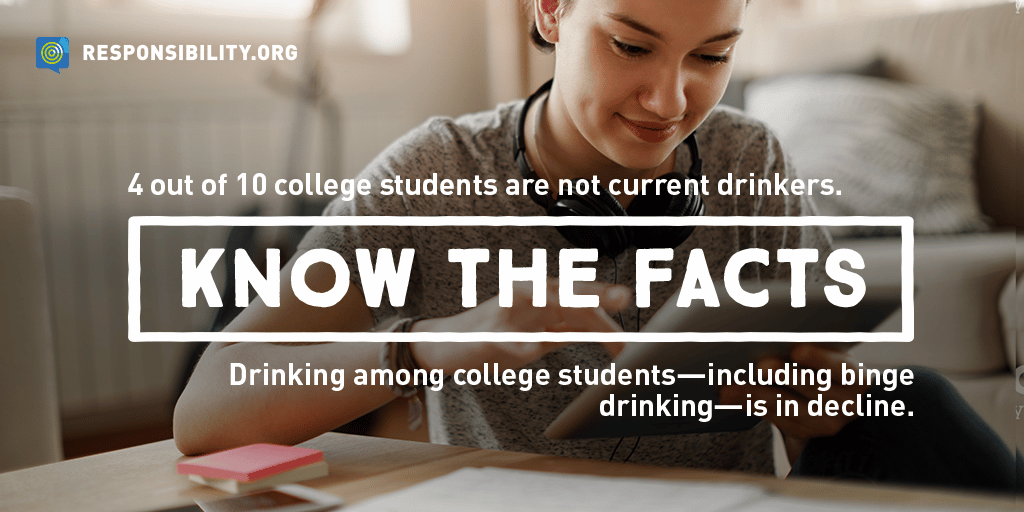
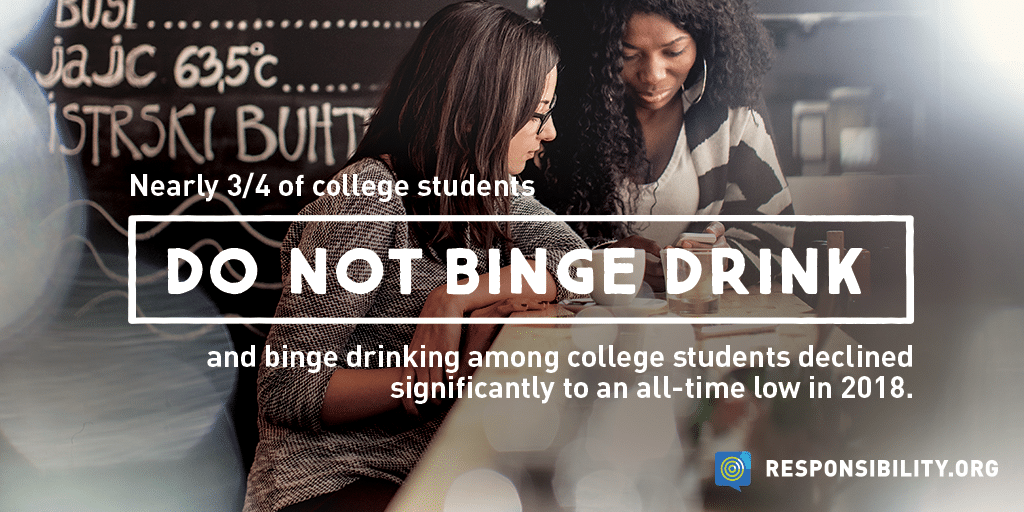
DETERMINE YOUR VALUES
Before sending your high school graduate off to college, discuss your family beliefs, attitudes, and expectations when it comes to alcohol. Discuss various reasons why to refuse a drink and how to say NO. These may include:
- It’s illegal to drink underage.
- Substance use disorders (like alcoholism) run in your family.
- It is not in line with your family’s belief system or religion.
- You don’t want to get in trouble with teachers, coaches, or residential assistants.
Realize that your college-bound student will most likely be in a social situation where drinking is happening, and some of the people they are with could be of legal drinking age. Discuss how they should decide whether or not to refuse a drink, and talk about the various reasons to avoid alcohol and how and when to say "no.”
Remind them that the decisions they make after drinking are still their decisions, and that they are responsible for them. These decisions have to be aligned with your student’s values as well!
Remind them that the legal drinking age is 21 and engaging in underage drinking is against the law.
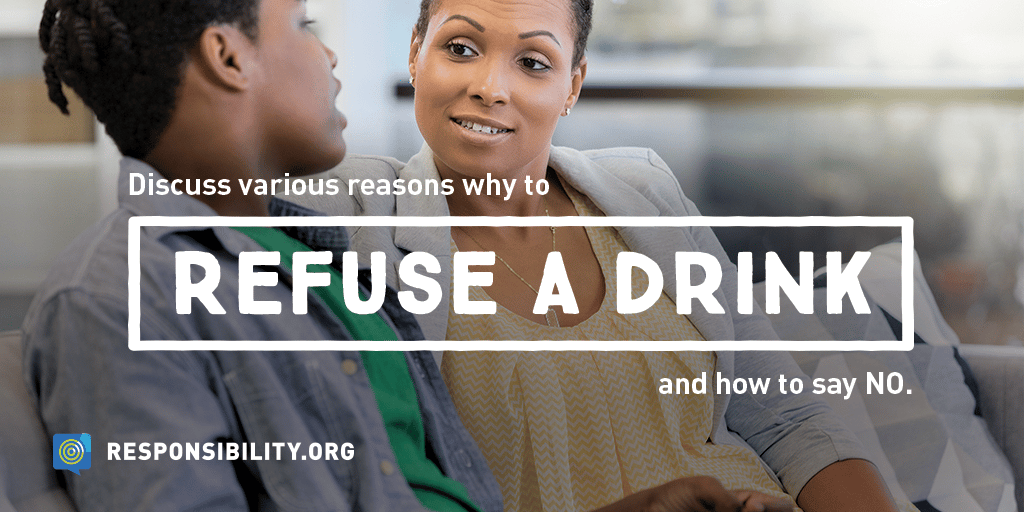
PRACTICE SITUATIONAL AWARENESS
Remember that you don’t want to talk about alcohol all by itself; drinking and binge drinking do not exist in a vacuum. You want to remind your student to be aware of why people are drinking and the environment in which they are drinking.
For instance, talk to your college-aged student about being cautious of situations or parties that are designed to conceal what’s happening inside. There’s probably a reason that they are held in secret, and that should be a warning sign to be extra vigilant.
Parties where non-drinkers aren’t welcome, where the alcohol content of what is being served isn’t clear (for example when a pre-mixed punch is being served), and where games are being played to accelerate and produce intoxication are higher risk. Alcohol intake should decrease when risk is increased!
Similar to when they were little and learning to cross the street or go trick-or-treating, the college social scene is also a time to activate the “buddy system” and to emphasize the importance of keeping an eye on friends and being prepared to step in if someone has overconsumed or needs help getting home safely.
Also discuss navigating and avoiding high-risk situations. Teach your college student to never leave any drink unattended—whether or not the beverage contains alcohol. And don’t accept a drink from someone you don’t know, especially if you did not see where it came from.
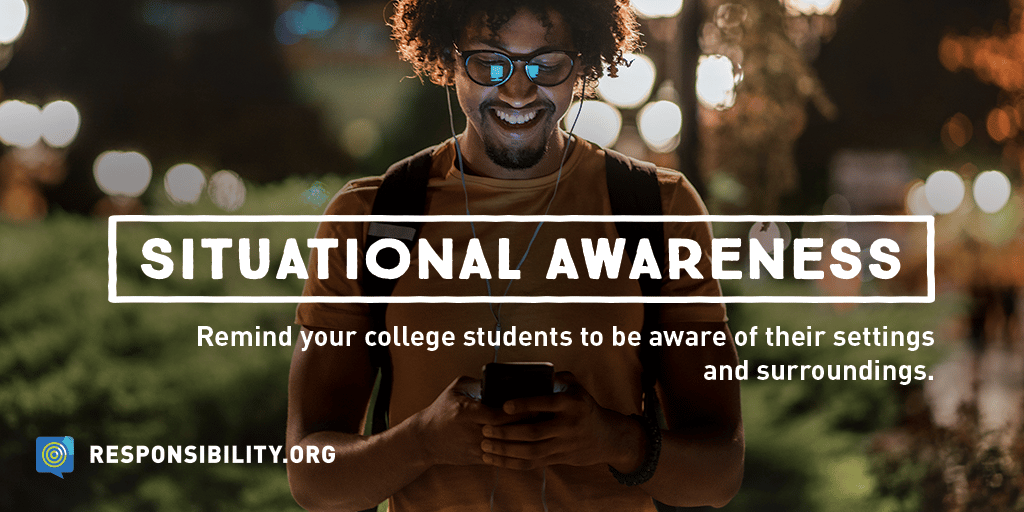
ATTITUDE IS EVERYTHING
When it comes to navigating the college social scene, attitude is everything. This is true whether you are discussing a positive mindset, pessimistic behavior, or throwing caution to the wind. A few things to include in your conversation are:
- Purposefully overconsuming—drinking to get drunk—is unacceptable and dangerous.
- Drinking to cope with stress, to forget problems or to try to feel comfortable in a situation that feels unsafe or threatening is never a good idea.
- Your mindset—positive or negative—will impact your actions, whether you chose to drink alcohol or not.
- Risky decisions multiply. The decision to overconsume will most likely not be the only bad choice you make.
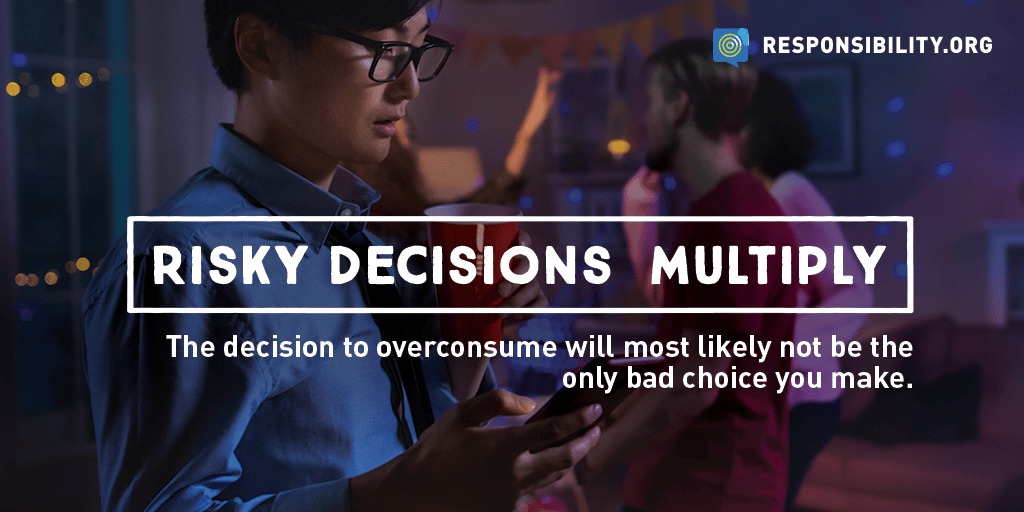
BE ENGAGED
Even if you don’t have a college-aged student, you may one day, so start talking now. Create an environment of honesty and respect that will encourage your kids to come to you in any situation at every age. Encourage your student to be active and involved in campus life and activities.
Know where your student can go for help and resources—and be sure that they have this information handy. Even if they never need it or use it, they may be able to help a friend in need. For information about how alcohol will affect their blood alcohol content (BAC), consider downloading our Virtual Bar app.
STAY IN TOUCH
Out of sight may be out of mind for some things, but not for you and your college-aged kids (they are still your kids after all!). Try these five tips for staying in touch with your students to support them in making healthy decisions when it comes to school, friends, and behaviors.
- Schedule a set time to talk and catch up with your student.
- When you talk, listen for warning signs such as disengagement, apathy, or symptoms of anxiety or depression.
- Look for signs of lifestyle changes in your student such as a change in appearance, demeanor, or friends.
- Exchange contact information with your student’s roommates, friends, residential assistant, or their peers’ parents.
- Follow each other on social media—but be aware that many young adults have multiple accounts on the same platform.


